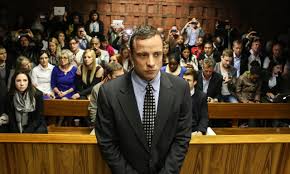The judge in the Oscar Pistorius trial has cleared him of murder, but has left it to Friday to announce whether the athlete is guilty of culpable homicide.
Oscar Pistorius in courtto
Judge Thokozile Masipa said prosecutors had not proved he meant to kill his girlfriend Reeva Steenkamp, prompting tears from the Olympic sprinter.
But she said he acted hastily and had been negligent. Mr Pistorius says he thought an intruder was in the toilet.
Adjourning the trial, the judge said a reasonable person would not have fired.
The BBC’s Andrew Harding, who was in court in Pretoria, says she is expected to deliver a verdict of culpable homicide (manslaughter) but has not yet spelled it out.
Earlier, Judge Masipa described Mr Pistorius as an evasive witness but said this did not mean he was guilty.
Clearing him of murder charges, she said he could not have foreseen killing whoever was behind the toilet door.
The South African Olympic and Paralympic sprinter had denied murdering Ms Steenkamp after a row on Valentine’s Day last year, saying he shot her by mistake.
Mr Pistorius, 27, has pleaded not guilty to all the charges he faces, including two counts of shooting a firearm in public and the illegal possession of ammunition.
While finding Oscar Pistorius not guilty of murder, Judge Masipa appears to be leaning towards the lesser charge of manslaughter, known in South Africa as culpable homicide.
Minutes after the lunch break, she seemed to be on the verge of announcing her verdict, only to stop abruptly and adjourn until Friday – leading to sighs and gasps in the overflow court.
Judge Masipa didn’t mince her words when she said the athlete, who has a good knowledge of guns, acted negligently by firing four shots into a confined space. She questioned why he did not phone for help or run to the balcony instead of confronting the apparent danger – questions that have plagued many.
Following a long trial that has gripped people around the world, Judge Masipa seems to want to give a detailed account before announcing her verdict. South Africa’s legal system has also been on trial and many believe the athlete is getting off lightly, possibly because of his fame.
But legal experts argue that the judge has merely followed the law and the evidence before her. The onus was on the state to prove its case beyond reasonable doubt, which the judge said it had failed to do.
Judge Masipa began by detailing the charges against the athlete and repeating extracts of his testimony, reading in a slow, measured way.
She then moved on to a summary of the trial.
A tense-looking Mr Pistorius looked on from the dock, and wept several times during the proceedings.
The judge questioned the reliability of several witnesses who apparently heard screams and gunshots at the time of the incident, saying most of those who said they had heard the incident had “got facts wrong”.
The prosecution had used these witnesses to try to prove that Mr Pistorius had killed Ms Steenkamp with premeditation after an argument.
Later in her judgement, Judge Masipa concluded that the prosecution had failed in this.
“The state has not proved beyond reasonable doubt that the accused is guilty of premeditated murder,” she said. “There are just not enough facts to support such a finding.”
The judge added that the accused believed his life was in danger and therefore could not be found guilty of a lesser charge of murder.
“How could the accused reasonably have foreseen that the shot he fired would kill the deceased?” she said.
“Clearly he did not subjectively foresee this as a possibility, that he would kill the person behind the door, let alone the deceased as he thought she was in the bedroom at the time.”
But Judge Masipa then adjourned for lunch before moving on to the charge of culpable homicide which suggests negligence without intention to kill and which could still mean a jail sentence.
“The accused knew there was a person behind the toilet door, he chose to use a firearm. Would a reasonable person in the same circumstances as the accused have foreseen the possibility that if he fired four shots whoever was behind the toilet might be struck and die as a result?
She said the answer was yes.
“I am of the view that the accused acted too hastily and used excessive force. In the circumstances, it is clear that his conduct was negligent,” she said, before abruptly adjourning for the day.
Her decision to do so took many by surprise.
Throughout the day the court witnessed Judge Masipa’s logic and style – gentle, tolerant of error from witnesses, but razor sharp, reports the BBC’s Andrew Harding.
Most of the trial, which began on 3 March 2014, has been televised and attracted worldwide attention.
Before the fatal shooting, the 27-year-old double amputee was feted in South Africa and known as the “blade runner”.
He had won gold at the London 2012 Paralympic Games and also competed at the Olympics.
The judgement at his trial is likely to be well over 100 pages. The judge went through each charge, summing up the prosecution and defence cases and analysing the evidence.
Ms Steenkamp, a 29-year-old model and law graduate, was hit three times by bullets shot through a toilet door by Mr Pistorius at his home in the capital, Pretoria, in the early hours of 14 February 2013.
He denies the prosecution’s allegation that the couple – who had been dating for three months – had rowed.
The athlete said he thought she was still in the bedroom when he heard a noise in the bathroom, which he believed to be an intruder.
The prosecution have tried to characterise Mr Pistorius as a “hothead”, while his defence team have portrayed him as having a heightened response to perceived danger because of his disability and background.
In July, a psychiatric report requested by the judge said Mr Pistorius had post-traumatic stress disorder but no mental illness that could prevent him being held criminally responsible for his actions.














